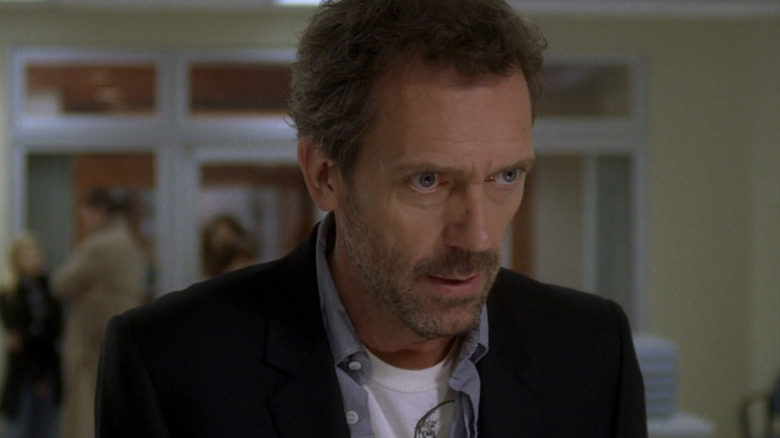Is Hugh Laurie's Dr. Gregory House Based On A Real Person?
Anyone who caught "House" — still one of the best medical dramas ever made — during its original 2004-to-2012 run likely has a soft spot for Hugh Laurie's cranky physician, Dr. Gregory House. Turns out, the nihilist fond of cutting down colleagues with caustic remarks is indirectly based on a real person.
Show creator David Shore has spoken about how House is based on Sherlock Holmes, who, in turn, was based on a real 19th-century Scottish surgeon and forensic science pioneer named Joseph Bell. Bell was also a lecturer at the University of Edinburgh, who actually taught "Sherlock Holmes" author Arthur Conan Doyle sometime between 1876 and 1881, when the young author attended the university.
More than a century later, when Shore was developing the character of Gregory House, he took similar inspiration from Holmes, and by extension, from Bell. In an interview with the Television Academy, Shore spoke about the genesis of House, revealing that he spent a lot of time "trying to figure out 'what is this show?' and 'who is this guy?'" He went on to admit that while his own cynicism made it into the character, Sherlock Holmes was a "big part" of it as well.
Shore even confirmed that the title character's name was "a reference to Sherlock Holmes" in the sense that Holmes sounds like "homes," and that Dr. James Wilson (played by Robert Sean Leonard) was given his last name because it closely mirrored the name of Holmes' sidekick, Dr. John Watson.
Who was Joseph Bell?
Arthur Conan Doyle met Joseph Bell when he attended the physician's classes at the University of Edinburgh, and later became Bell's clerk at the Edinburgh Royal Infirmary. He couldn't have had a better teacher at the time, as Bell was a highly respected doctor who served as Queen Victoria's personal surgeon whenever her majesty was in Scotland. As an article in the American Journal of Medicine notes, Bell's diagnostic intuitions "astonished medical students and patients alike — even before patients uttered a word," which is about as close to a 19th-century Gregory House as you can get.
According to the authors, Bell was able not only to describe patients' symptoms but also to give accurate accounts of their lives, making his diagnostic skills legendary among his peers. He's said to have been able to look at a patient's hands and determine that person's job, or tell them where they'd been that day by looking at their shoes. These powers of deduction obviously found their way into Sherlock Holmes, but they're also clearly evident in the character of House.
Bell is also quoted as having told a reporter, "Every good teacher, if he is to make his students good doctors, must get them to cultivate the habit of noticing the little apparent trifles." If we compare that to Hugh Laurie's misanthropic diagnostician, those trifles take the form of lies. House was an expert at spotting when his patients were lying and cultivated his own habit of noticing these "trifles" throughout the series. Just how much the writers were drawing on Bell's example remains unclear, but there's evidence in the show itself that Bell was just as much an inspiration for the character as Sherlock Holmes.
There's a lot of Joseph Bell in Gregory House
"House," which ended with a shocker of a finale in 2012, wasn't shy about showing off its Sherlock Holmes connection. In the Season 2 finale, "No Reason," House is shot by someone named Jack Moriarty, who shares a surname with Holmes' archnemesis, Professor James Moriarty. House also was beset by Holmes' substance abuse problems, too, nursing a Vicodin addiction throughout the series, much like the famous detective uses cocaine. What's more, the number of House's home is 221B, an exact match for the address of Holmes' famous Baker Street abode.
Less obvious from watching the show, however, is the connection between House and Bell. In 2006, the Radio Times caught up with David Shore and asked him about the House-Holmes connection and how Bell figured into the equation. Shore described Bell as someone who could "walk into a waiting room and diagnose people without speaking to them," which is essentially what Dr. House does throughout the series.
"House" also contained other references to Bell, making clear that while Holmes was the main inspiration, the parallels between the doctor and his 19th-century counterpart weren't lost on the writers. In the Season 5 episode "Joy to the World," we learn that Wilson had gifted House a book called "A Manual on the Operations of Surgery," which was authored by Bell in 1869. When Kal Penn's Lawrence Kutner looks at the inscription in House's copy, it reads, "Greg, made me think of you."


